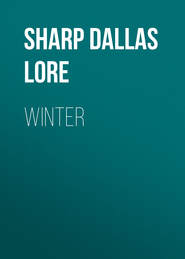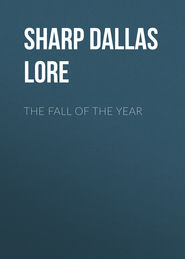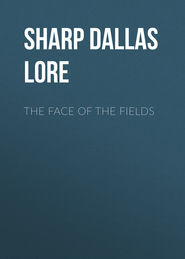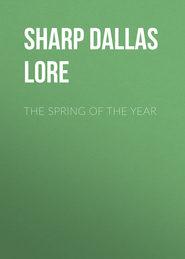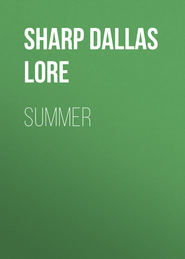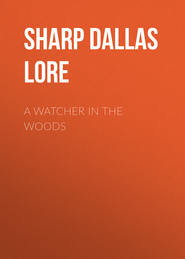По всем вопросам обращайтесь на: info@litportal.ru
(©) 2003-2024.
✖
The Seer of Slabsides
Настройки чтения
Размер шрифта
Высота строк
Поля
One must be able to walk to an editorial office and back, and all the way walk humbly with his theme, as Burroughs ever does – not entirely forgetful of himself, nor of me (because he has invited me along); but I must be quiet and not disturb the fishing – if we go by way of a trout-stream.
True to the facts, Burroughs is a great deal more than scientific, for he loves the things – the birds, hills, seasons – as well as the truths about them; and true to himself, he is not by any means a simple countryman who has never seen the city, a natural idyl, who lisps in books and essays, because the essays come. He is fully aware of the thing he wants to do, and by his own confession has a due amount of trouble shaping his raw material into finished literary form. He is quite in another class from the authors of "The Complete Angler" and "New England's Rarities Discovered." In Isaak Walton, to quote Leslie Stephen, "a happy combination of circumstances has provided us with a true country idyl, fresh and racy from the soil, not consciously constructed by the most skillful artistic hand."
Now the skillful artistic hand is everywhere seen in John Burroughs. What writer in these days could expect happy combinations of circumstances in sufficient numbers for so many volumes?
But being an idyl, when you come to think of it, is not the result of a happy combination of circumstances, but rather of stars – of horoscope. You are born an idyl or you are not, and where and when you live has nothing to do with it.
Who would look for a true country idyl to-day in the city of Philadelphia? Yet one came out of there yesterday, and lies here open before me, on the table. It is a slender volume, called "With the Birds, An Affectionate Study," by Caroline Eliza Hyde. The author is discussing the general subject of nomenclature and animal distribution, and says:
"When the Deluge covered the then known face of the earth, the birds were drowned with every other living thing, except those that Noah, commanded by God, took two by two into the Ark.
"When I reflect deeply and earnestly about the Ark, as every one should, thoughts crowd my mind with an irresistible force."
[And they crowd my mind, too.]
"Noah and his family had preserved the names of the birds given them by Adam. This is assured, for Noah sent a raven and a dove out to see if the waters had abated, and we have birds of that name now. Nothing was known of our part of the globe, so these birds must have remained in the Holy Land for centuries. We do not hear of them until America was discovered…
"Bats come from Sur. They are very black mouse-like birds, and disagreeable… The bobolink is not mentioned in the Bible, but it is doubtless a primitive bird. The cock that crows too early in the morning … can hardly be classed with the song-birds. The name of the humming-bird is not mentioned in the Bible, but as there is nothing new under the sun, he is probably a primitive bird."
Burroughs would have agreed that the humming-bird is probably a primitive bird; and also that this is a true idyl, and that he could not write a true idyl if he tried. No one could write like that by trying. And what has any happy combination of circumstances to do with it? No, a book essentially is only a personality in type, and he who would not be frustrated of his hope to write a true idyl must himself be born a true idyl. A fine Miltonic saying!
John Burroughs was not an idyl, but an essayist, with a love for books only second to his love for nature; a watcher in the woods, a tiller of the soil, a reader, critic, thinker, poet, whose chief business these sixty years has been the interpretation of the out-of-doors.
Upon him as interpreter and observer, certain of his books, "Ways of Nature" and "Leaf and Tendril," are an interesting comment.
Truth does not always make good literature, not when it is stranger than fiction, as it often is; and the writer who sticks to the truth of nature must sometimes do it at the cost of purely literary ends. Have I sacrificed truth to literature? asks Burroughs of his books. Have I seen in nature the things that are there, or the strange man-things, the "winged creeping things which have four feet," and which were an abomination to the ancient Hebrews, but which the readers of modern nature-writing do greedily devour – are these the things I have seen? And for an answer he sets about a reëxamination of all he has written, from "Wake-Robin" to "Far and Near," hoping "that the result of the discussion or threshing will not be to make the reader love the animals less, but rather to love the truth more."
But the result, as embodied in "Ways of Nature" and in "Leaf and Tendril," is quite the opposite, I fear; for these two volumes are more scientific in tone than any of his other work; and it is the mission, not of science, but of literature, to quicken our love for animals, even for truth. Science only adds to the truth. Yet here, in spite of himself, Burroughs is more the writer, more the interpreter, than the investigator. He is constantly forgetting his scientific thesis, as, for instance, in the account of his neighbor's errant cow. He succeeds finally, however, in reducing her fairly well to a mechanical piece of beef acting to vegetable stimuli upon a nerve ganglion located somewhere in the region between her horns and her tail.
Now, all this is valuable, and the use made of it is laudable, but would we not rather have the account than the cow, especially from Burroughs? Certainly, because to us it is the account that he has come to stand for. And so, if we do not love his scientific animals more, and his scientific findings more, we shall, I think, love all his other books more; for we see now that, from the beginning, he has regarded the facts of nature as the solid substance of his books, to be kept as free from fancy and from false report, as his interpretation of them is to be kept free from all exaggeration and cant.
Here, then, are a score of volumes of honest seeing, honest feeling, honest reporting. Such honesty of itself may not make good nature-literature, but without such honesty there can be no good nature-literature.
Nature-literature is not less than the truth, but more; how much more, Burroughs himself suggests to us in a passage about his literary habits.
"For my part," he says, "I can never interview Nature in the reporter fashion. I must camp and tramp with her to get any good, and what I get I absorb through my emotions rather than consciously gather through my intellect… An experience must lie in my mind a certain time before I can put it upon paper – say from three to six months. If there is anything in it, it will ripen and mellow by that time. I rarely take any notes, and I have a very poor memory, but rely upon the affinity of my mind for a certain order of truths or observations. What is mine will stick to me, and what is not will drop off. We who write about Nature pick out, I suspect, only the rare moments when we have had glimpses of her, and make much of them. Our lives are dull, our minds crusted over with rubbish like those of other people. Then writing about Nature, or about most other subjects, is an expansive process; we are under the law of evolution; we grow the germ into the tree; a little original observation goes a good way." For "when you go to Nature, bring us good science or else good literature, and not a mere inventory of what you have seen. One demonstrates, the other interprets."
Careful as John Burroughs has been with his facts, so careful as often to bring us excellent science, he yet has left us no inventory of the out-of-doors. His work is literature; he is not a demonstrator, but an interpreter, an expositor who is true to the text and true to the whole of the context.
Our pleasure in Burroughs as an interpreter comes as much from his wholesome good sense, from his balance and sanity, I think, as from the assurance of his sincerity. Free from pose and cant and deception, he is free also from bias and strain. There is something ordinary, normal, reasonable, companionable, about him; an even tenor to all his ways, a deliberateness, naturalness to all his paths, as if they might have been made originally by the cows. So they were.
If Burroughs were to start from my door for a tramp over these small Hingham hills he would cross the trout-brook by my neighbor's stone bridge, and, nibbling a spear of peppermint on the way, would follow the lane and the cow-paths across the pasture. Thoreau would pick out the deepest hole in the brook and try to swim across; he would leap the stone walls of the lane, cut a bee-line through the pasture, and drop, for his first look at the landscape, to the bottom of the pit in the seam-face granite quarry. Here he would pull out his notebook and a gnarly wild apple from his pocket, and, intensely, critically, chemically, devouring said apple, make note in the book that the apples of Eden were flat, the apples of Sodom bitter, but this wild, tough, wretched, impossible apple of the Hingham hills united all ambrosial essences in its striking odor of squash-bugs.
Burroughs takes us along with him. Thoreau comes upon us in the woods – jumps out at us from behind some bush, with a "Scat!" Burroughs brings us home in time for tea; Thoreau leaves us tangled up in the briars.
It won't hurt us to be jumped at now and then and told to "scat!" It won't hurt us to be digged by the briars. It is good for us, otherwise we might forget that we are beneath our clothes. It is good for us and highly diverting, – and highly irritating too.
But Thoreau stands alone. "Walden Pond" is one of America's certain contributions to the world's great books.
For my part, when I take up an outdoor book I am glad if there is quiet in it, and fragrance, and something of the saneness and sweetness of the sky. Not that I always want sweet skies. It is ninety-eight degrees in the shade, and three weeks since there fell a drop of rain. I could sing like a robin for a sizzling, crackling thunder-shower – less for the sizzling and crackling than for the shower. Thoreau is a succession of showers – "tempests"; his pages are sheet-lightning, electrifying, purifying, illuminating, but not altogether conducive to peace. "Walden Pond" is something more than a nature book. There is a clear sky to most of Burroughs's pages, a rural landscape, wide, gently rolling, with cattle standing here and there beneath the trees.
Burroughs's natural history is entirely natural, his philosophy entirely reasonable, his religion and ethics very much of the kind we wish our minister and our neighbor might possess; and his manner of writing is so unaffected that we feel we could write in such a manner ourselves. Only we cannot.
Since the time he can be said to have "led" a life, Burroughs has led a literary life; that is to say, nothing has been allowed to interfere with his writing; yet the writing has not been allowed to interfere with a quiet successful business – with his raising of grapes.
He has a study and a vineyard.
Not many men ought to live by the pen alone. A steady diet of inspiration and words is hard on the literary health. The writing should be varied with some good, wholesome work, actual hard work for the hands; not so much work, perhaps, as one would find in an eighteen-acre vineyard; yet John Burroughs's eighteen acres certainly proved to be no check – rather, indeed, a stimulus – to his writing. He seems to have gathered a volume out of every acre; and he seems to have put a good acre into every volume. "Fresh Fields" is the name of one of the volumes, "Leaf and Tendril" of another; but the freshness of his fields, the leaves and the tendrils of his vineyard, enter into them all. The grapes of the vineyard are in them also.
Here is a growth of books out of the soil, books that have been trimmed, trained, sprayed, and kept free from rot. Such books may not be altogether according to the public taste; they will keep, however, until the public acquires a better taste. Sound, ripe, fresh, early and late, a full crop! Has the vineyard anything to do with it?
It is not every farmer who should go to writing, nor every writer who should go to farming; but there is a mighty waste of academic literature, of premature, precocious, lily-handed literature, of chicken-licken literature, because the writers do not know a spade when they see one, would not call it a spade if they knew. Those writers need to do less writing and more farming, more real work with their soft hands in partnership with the elemental forces of nature, or in comradeship with average elemental men – the only species extant of the quality to make writing worth while.
John Burroughs had this labor, this partnership, this comradeship. His writing is seasoned and sane. It is ripe, and yet as fresh as green corn with the dew in the silk. You have eaten corn on the cob just from the stalk and steamed in its own husk? Green corn that is corn, that has all its milk and sugar and flavor, is corn on the cob, and in the husk – is cob and kernel and husk – not a stripped ear that is cooked into the kitchen air.
Literature is too often stripped of its human husk, and cut from its human cob: the man gone, the writer left; the substance gone, the style left – corn that tastes as much like corn as it tastes like puffed rice – which tastes like nothing at all. There is the sweetness of the husk, the flavor of the cob, the substance of the uncut corn to John Burroughs.
There is no lack of cob and husk to Thoreau – of shell and hull, one should say, for he is more like a green walnut than an ear of green corn. Thoreau is very human, a whole man; but he is almost as much a tree, and a mountain, and a pond, and a spell of weather, and a state of morals. He is the author of "Walden," and nobody else in the world is that; he is a lover of Nature, as ardent a lover as ever eloped with her; he is a lover of men, too, loving them with an intensity that hates them bag and baggage; he is poetical, prophetic, paradoxical, and utterly impossible.
But he knew it. Born in Concord, under the transcendental stars, at a time when Delphic sayings and philosophy, romance and poetry ran wild in the gardens where Bouncing-Bet and Wayward Charlie now run wild, Thoreau knew that he was touched, and that all his neighbors were touched, and sought asylum at Walden. But Walden was not distant enough. If John Burroughs in Roxbury, New York, found it necessary to take to the woods in order to escape from Emerson, then Thoreau should have gone to Chicago, or to Xamiltepec.
It is the strain, in Thoreau, that wearies us; his sweating among the stumps and woodchucks, for a bean crop netting him eight dollars, seventy-one and one half cents. But such beans! Beans with minds and souls! Yet, for baking, plain beans are better than these transcendental beans, because your transcendental beans are always baked without pork. A family man, however, cannot contemplate that piddling patch with any patience, even though he have a taste for literature as real as his taste for beans. It is better to watch John Burroughs pruning his grapevines for a crop to net him one thousand, three hundred and twenty-five dollars, and no cents, and no half-cents. Here were eighteen acres to be cultivated, whose fruit was to be picked, shipped, and sold in the New York markets at a profit – a profit plainly felt in John Burroughs's books.
Reading what I have just said, as it appeared in the "Atlantic" for November, 1910, Burroughs wrote in the course of a letter to me:
"I feel like scolding you a little for disparaging Thoreau for my benefit. Thoreau is nearer the stars than I am. I may be more human, but he is as certainly more divine. His moral and ethical value I think is much greater, and he has a heroic quality that I cannot approach."
Perhaps no truer word will ever be said of these two men than that; and certainly no more generous word was ever spoken by one great writer of another, his nearest rival. I have not, nor would I, disparage Thoreau for Burroughs's benefit. Thoreau dwells apart. He is long past all disparagement. "Walden Pond" and "The Week," if not the most challenging, most original books in American literature, are, with Whitman's "Leaves of Grass" and Emerson's "Essays," among those books.
Thoreau and Burroughs had almost nothing in common except their love of nature, and in that they were farther apart than in anything else, Thoreau searching by night and day in all wild places for his lost horse and hound while Burroughs quietly worshiped, as his rural divinity, the ruminating cow.
The most worthy qualities of good writing are those least noticeable – negative qualities of honesty, directness, sincerity, euphony; noticeable only by their absence. Yet in John Burroughs they amounted to a positive charm. Indeed, are not these same negative qualities the very substance of good style? Such style as is had by a pair of pruning-shears, as is embodied in the exquisite lines of a flying swallow – the style that is perfect, purposeful adaptability?
But there is more than efficiency to John Burroughs's style; there are strengths and graces existing in and for themselves. Here is a naturalist who has studied the art of writing. "What little merit my style has," he declares, "is the result of much study and discipline." And whose style, if it be style at all, is not the result of much study and discipline? Flourish, fine-writing, wordiness, obscurity, and cant are exorcised in no other way; and as for the "limpidness, sweetness, freshness," which John Burroughs says should characterize outdoor writing, and which do characterize his writing, how else than by study and discipline shall they be obtained?
Outdoor literature, no less than other types of literature, is both form and matter; the two are mutually dependent, inseparably one; but the writer is most faithful to the form when he is most careful of the matter. It makes a vast difference whether his interest is absorbed by what he has to say, or by the possible ways he may say it. If John Burroughs wrote in his shirt-sleeves, as a recent critic says he did, it was because he went about his writing as he went about his vineyarding – for grapes, for thoughts, and not to see how pretty he could make a paragraph look, or into what fantastic form he could train a vine. The vine is lovely in itself – if it bear fruit.
And so is language. Take John Burroughs's manner in any of its moods: its store of single, sufficient words, for instance, especially the homely, rugged words and idioms, and the flavor they give, is second to the work they do; or take his use of figures – when he speaks of De Quincey's "discursive, roundabout style, herding his thoughts as a collie dog herds sheep" – and unexpected, vivid, apt as they are, they are even more effective. One is often caught up by the poetry of these essays and borne aloft, but never on a gale of words; the lift and sweep are genuine emotion and thought.
As an essayist – as a nature-writer I ought to say – John Burroughs's literary care is perhaps nowhere so plainly seen as in the simple architecture of his essay plans, in their balance and finish, a quality that distinguishes him from others of the craft, and that neither gift nor chance could so invariably supply. The common fault of outdoor books is the catalogue – raw data, notes. There are paragraphs of notes in John Burroughs, volumes of them in Thoreau. The average nature-writer sees not too much of nature, but knows all too little of literary values; he sees everything, gets a meaning out of nothing; writes it all down; and gives us what he sees, which is precisely what everybody may see; whereas, we want also what he thinks and feels. Some of our present writers do nothing but feel and divine and fathom – the animal psychologists, whatever they are. The bulk of nature-writing, however, is journalistic, done on the spot, into a notebook, as were the journals of Thoreau – fragmentary, yet with Thoreau often exquisite fragments – bits of old stained glass, unleaded, and lacking unity and design.
No such fault can be found with John Burroughs. He went pencilless into the woods, and waited before writing until his return home, until time had elapsed for the multitudinous details of the trip to blur and blend, leaving only the dominant facts and impressions for his pen. Every part of his work is of selected stock, as free from knots and seams and sapwood as a piece of old-growth pine. There is plan, proportion, integrity to his essays – the naturalist living faithfully up to a sensitive literary conscience.
John Burroughs was a good but not a great naturalist, as Audubon and Gray were great naturalists. His claim (and Audubon's in part) upon us is literary. He was a watcher in the woods; he made a few pleasant excursions into the primeval wilderness, leaving his gun at home, and his camera, too, thank Heaven! He broke out no new trail, discovered no new animal, no new thing. But he saw all the old, uncommon things, saw them oftener, watched them longer, through more seasons, than any other writer of our out-of-doors; and though he discovered no new thing, yet he made discoveries, volumes of them – contributions largely to our stock of literature, and to our store of love for the earth, and to our joy in living upon it. He turned a little of the universe into literature; translated a portion of the earth into human language; restored to us our garden here eastward in Eden – apple-tree and all.
For a real taste of fruity literature, try John Burroughs's chapter on "The Apple." Try Thoreau's, too, – if you are partial to squash-bugs. There are chapters in John Burroughs, such as "Is it going to Rain?" "A River View," "A Snow-Storm," which seem to me as perfect, in their way, as anything that has ever been done – single, simple, beautiful in form, and deeply significant; the storm being a piece of fine description, of whirling snow across a geologic landscape, distant, and as dark as eternity; the whole wintry picture lighted and warmed at the end by a glowing touch of human life:
"We love the sight of the brown and ruddy earth; it is the color of life, while a snow-covered plain is the face of death; yet snow is but the mark of life-giving rain; it, too, is the friend of man – the tender, sculpturesque, immaculate, warming, fertilizing snow."






